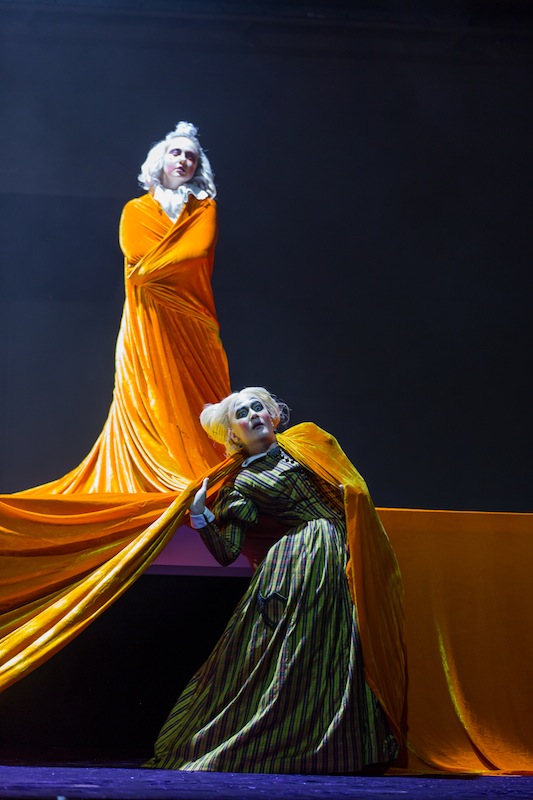Horror and comedy make for a mixed closing bill at Wolf Trap Opera

Megan Mikailovna Samarin (top) and Annie Rosen in Wolf Trap Opera’s production of “The Juniper Tree” by Philip Glass and Robert Moran. Photo: Scott Suchman
Wolf Trap Opera is marking the 80th birthday year of Philip Glass by staging two of the American composer’s lesser-known operas this season. In June the company collaborated with Halcyon Stage in a production of The Fall of the House of Usher, directed by Septime Webre. Now, for its final staging of the summer Wolf Trap is presenting a double-bill featuring The Juniper Tree, which Glass co-composed with Robert Moran, seen Friday night at the Barns.
The connection between the two Glass works is librettist Arthur Yorinks, who took the scenario of The Juniper Tree quite literally from the rather horrifying fairy tale of the same title by the Brothers Grimm. A man with one son by a previous marriage remarries and has a daughter. Jealous of her husband’s first wife, the stepmother kills her stepson and serves him to her husband in a stew.
The sister buries the boy’s bones under the juniper tree, where the first wife was also buried. His spirit reappears as a bird that sings of his murder. It brings gifts to the family, including a millstone that it drops on the stepmother, killing her. The boy rises from the dead, and they all live happily ever after. (It may be a fairy tale, but leave the kids at home.)
As with Webre’s Usher production, director R. B. Schlather has gone full nightmare in this staging, with a barren set consisting mostly of a large, stage-filling table. A trapdoor in the table became the lid of the apple crate used to kill the son. Creepy but silly costumes and makeup (scenic and costume design by Blake Palmer) most recall the cartoonish distortion of a Tim Burton film. Heavy fog from several smoke machines filled the stage and the house for much of the opera’s duration.
Mezzo-soprano Annie Rosen had bone-chilling vocal power as the stepmother, with a strident tone that could cut through all but the most overwhelming sound from the pit–fortunately, since the orchestra was too often allowed to dominate by conductor Lidiya Yankovskaya. This balancing issue most impacted the tender performance of the son by soprano Megan Mikailovna Samarin, whose smaller voice was often covered by the orchestra. That undercut the most beautiful moment in the opera, Glass’s hypnotic opening to Act II, where the boy-bird’s singing (“Mama killed me, Papa ate me”) entrances the people of the village.
Soprano Summer Hassan used her edgy, sharp-edged voice to unhinged effect as the first wife, presented here as mentally unbalanced. Baritone Ben Edquist made a nondescript husband, largely because he also was too softly projected to be heard clearly. Soprano Madison Leonard brought clear-toned sweetness to the role of the daughter. Wolf Trap studio artists took the supporting roles of villagers and the chorus of birds, costumed in clumsy bird-claw footwear.
The division of composition between Glass and Moran works well in this score, giving a welcome break from the former’s sturdy minimalism. Moran’s style is similar, but with more variation and more prominent glints of dissonance to contrast with all those minor-mode arpeggios. The wind playing of the Wolf Trap orchestra was consistent and smooth, with Glass’s insistent repetition requiring a different kind of virtuosity. Yankovskaya had some trouble keeping the performers aligned, with the strings sounding especially tentative.
The first half of the evening was devoted to John Musto’s Bastianello. This slender comic piece, with a libretto by Mark Campbell, tries very hard to be clever but with few jokes that landed. A crude wooden wall sliced off the front part of the stage for this work, with the singers, playing multiple roles, changing costumes in front of the audience. Summer Hassan was even more outrageous here, with a multiplicity of mugs and hilarious gestures in three different roles.
Mezzo-soprano Zoie Reams, who was a knockout in the June production of a Rossini rarity, had the best musical moment in Musto’s score. “Life! Life!,” a boozy number with a walking bass and swing-infused wind writing, turns into a duet and then a trio, and Reams sang it with flawless style and intonation, willing to use a range of vocal color all the way to downright ugly. Richard Ollarsaba was in fine voice in the title role, a groom so disgusted with the ignorance of his bride and parents that he goes on a search for people more stupid.
He finds them, but it is not much of a premise, even for such a short work. The choice to mount Bastianello again, after a 2010 production at Wolf Trap and another in 2014 by UrbanArias, seemed a wasted opportunity to present something new to its audiences. The choice of repertory at Wolf Trap is determined by the slate of singers, but something more in the fairy tale vein, like Martinů’s Ariane–or one of the Paul Hindemith short operas, to keep the feel of expressionist horror–would have been more welcome.
The double-bill of Bastianello and The Juniper Tree runs through August 19. wolftrap.org



